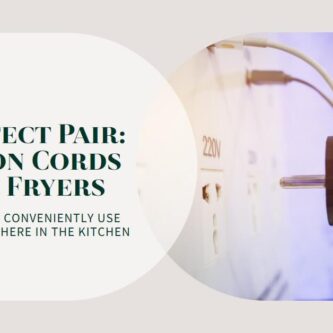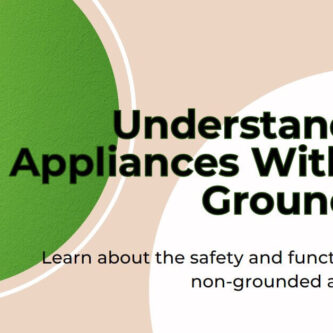Electrical safety is a crucial concern for anyone who uses electrical appliances and devices. One of the most commonly used electrical accessories in homes and workplaces is the extension cord.
However, extension cords can pose significant risks of electric shock and other electrical hazards, especially when they are of bad quality or used improperly.
In this article, we’ll explore the potential dangers of bad-quality extension cords and how they can cause electric shocks.
We’ll also discuss the factors that affect extension cord safety, the importance of choosing high-quality extension cords, and tips for safe extension cord use. Later in this article, I will provide you with a high-quality extension cord on Amazon.
Extension Cords: Overview
Before we dive into the topic of extension cord safety, let’s first define what extension cords are and how they work.
An extension cord is a flexible electrical cable that allows you to extend the reach of an electrical device or appliance.
Extension cords typically have a plug on one end that connects to a power outlet, and one or more sockets on the other end that receive plugs from devices or appliances.
Extension cords can come in different lengths, gauges, and types, depending on the intended use and the amount of electrical current they are designed to carry.
Extension cords are commonly used in households and workplaces for various purposes, such as powering outdoor tools and appliances, connecting multiple devices in a single outlet, or providing temporary power to a remote location.
However, using extension cords improperly or using low-quality cords can lead to electrical hazards, including electric shocks, fires, and electrocution.
Shock Hazards of Extension Cords
Electric shocks occur when an electric current flows through the body, causing damage to the tissues and organs.
Electric shocks can range from mild tingling sensations to severe burns and cardiac arrest, depending on the strength and duration of the current.
Electric shocks can also cause indirect injuries, such as falls or accidents due to muscle contractions.
Extension cords can pose various risks of electric shock, depending on several factors. Some of the most common causes of electric shock from extension cords include:
- Damaged or frayed cords: Extension cords can wear out over time or get damaged due to exposure to heat, moisture, or abrasion. Damaged cords can expose the electrical wires inside, increasing the risk of electric shock.
- Overloaded circuits: Using too many devices or appliances on a single extension cord or outlet can overload the circuit and cause overheating, which can lead to electrical fires or electric shocks.
- Misuse or abuse of cords: Extension cords should be used only for their intended purpose and in accordance with the manufacturer’s instructions. Misusing or abusing cords, such as using them as permanent wiring or pulling them forcefully, can damage the cords and increase the risk of electric shock.
Factors Affecting Extension Cord Safety
Several factors can affect the safety of extension cords, including their age, condition, quality, and use. Let’s take a closer look at each of these factors:
- Age and condition of the extension cord: Like any other appliance or device, extension cords can wear out over time or get damaged due to various factors, such as exposure to sunlight, moisture, or high temperatures. Old or damaged cords can pose significant risks of electric shock and should be replaced as soon as possible.
- Quality of the extension cord: Not all extension cords are created equal, and some are of better quality than others. High-quality extension cords are designed to withstand the stresses of everyday use and meet safety standards set by regulatory agencies, such as UL (Underwriters Laboratories) or CSA (Canadian Standards Association). Low-quality extension cords, on the other hand, may not meet these standards and may pose greater risks of electric shock and other hazards.
- Proper use and maintenance of extension cords:
Using extension cords properly and maintaining them regularly can significantly reduce the risks of electric shock and other electrical hazards. Some tips for safe extension cord use include:
- Use the right cord for the job: Choose an extension cord that is rated for the electrical load you will be using, and make sure it has the appropriate gauge and length for your needs.
- Check for damage before use: Inspect your extension cord for any signs of damage, such as frayed wires, cracked or broken plugs, or loose connections. If you find any damage, do not use the cord and replace it immediately.
- Do not overload the cord: Avoid using too many devices or appliances on a single extension cord or outlet, as this can overload the circuit and cause overheating or electrical fires.
- Do not use cords as permanent wiring: Extension cords should be used only as temporary solutions, and not as permanent wiring. If you need a permanent electrical connection, hire a qualified electrician to install it for you.
- Store your cords properly: Keep your extension cords coiled neatly and stored in a dry, cool place when not in use. Avoid leaving them exposed to sunlight, moisture, or extreme temperatures, as this can damage the cords and reduce their lifespan.
By following these guidelines and using high-quality extension cords, you can minimize the risks of electric shock and other electrical hazards in your home or workplace.
Choosing High-Quality Extension Cords
If you want to ensure the safety of your household, don’t hesitate to purchase a GE high-quality extension cord, UL-listed, from our trusted affiliate partner, Amazon.
One of the most important factors in extension cord safety is choosing high-quality cords that meet safety standards and are designed for your specific needs. Here are some features to look for when selecting a high-quality extension cord:
- Gauge and length: The gauge and length of the extension cord should be appropriate for the electrical load you will be using. Thicker gauges and shorter lengths can carry more current and reduce the risk of overheating or electric shock.
- Insulation: The insulation of the extension cord should be durable and resistant to heat, moisture, and abrasion. High-quality cords typically have thicker insulation and are made of materials such as PVC or rubber.
- Plugs and sockets: The plugs and sockets of the extension cord should be sturdy and well-made, with no cracks, chips, or loose connections. High-quality cords usually have molded plugs and sockets that provide a secure fit and reduce the risk of electric shock.
- Safety certifications: Look for extension cords that have been tested and certified by reputable safety organizations, such as UL, CSA, or ETL (Intertek), which ensure that the cords meet strict safety standards and have undergone rigorous testing for electrical performance and durability.
Investing in high-quality extension cords may cost more upfront, but it can save you money and prevent accidents in the long run.
Conclusion
In conclusion, bad-quality extension cords can indeed cause electric shock and other electrical hazards if used improperly or if they are old or damaged.
Factors such as the age, condition, quality, and use of the extension cord can significantly affect its safety.
To minimize the risks of electric shock and other hazards, it’s essential to use high-quality extension cords that meet safety standards and to follow safe extension cord use guidelines.
By taking these precautions, you can ensure that your electrical devices and appliances operate safely and efficiently, without putting yourself or others in danger.


